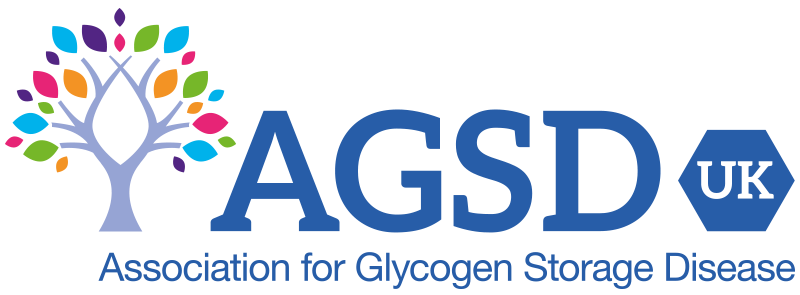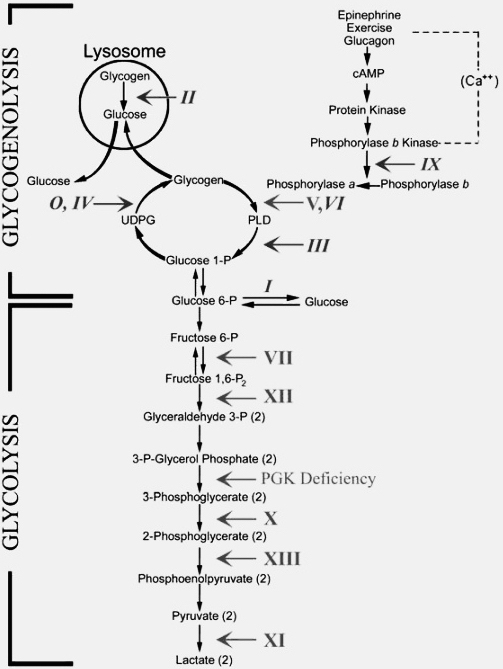GSD13, also known as beta-enolase deficiency, is a very rare disorder of an enzyme used in the breakown of glucose. It was first reported in 2001.
Patients so far described have a small amount of residual enzyme activity (c.5-20%) and their symptoms appear milder than McArdle disease. These can include exercise intolerance, myalgia, contracture, and generalised muscle weakness after exercise. Creatine kinase (CK) levels may be normal at baseline, but raised after intense activity.
With so few patients identified to date, the clinical picture and the age of onset for GSD13 has yet to be fully understood. Investigations may be triggered by an episode of rhabdomyolysis rather than presentation to a GP due to day to day symptoms. Next-generation sequencing may well start to show this condition to be more common than currently thought.
Two papers have been published on GSD13, describing three patients in total. Autosomal recessive mutations in the ENO3 gene are responsible for these cases.
Enolase comprises three subunits, each encoded by a different gene.
- The α subunit has been identified in many different tissues.
- The β (beta) subunit, which is involved in GSD13 and encoded by the ENO3 gene, is mostly found in muscle.
- The γ subunit is mainly found in nervous tissue.
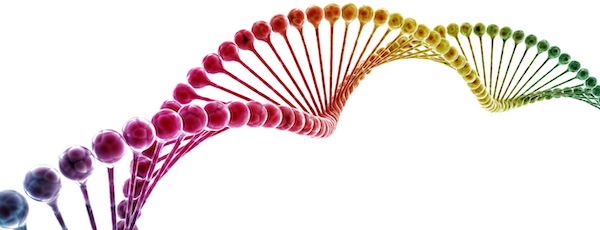
| Other names | β(beta)-enolase deficiency Glycogen Storage Disease Type XIII |
| Affected |
Neuromuscular |
| Inheritance | Autosomal recessive |
| Incidence | Unknown |
| UK diagnosed | About 3 (UK diagnosed explained) |
| Symptoms |
Can include exercise intolerance, myalgia, raised creatine kinase (CK) levels with intense activity |
| Secondary symptoms |
Muscle contracture and rhabdomyolysis |
| Treatment |
Maintain aerobic fitness, avoid anaerobic activity |
| Outlook |
Thought to be non-progressive |
Medical sources of information
There are two medical sources with some further information. Both of these websites are provided by American organisations.
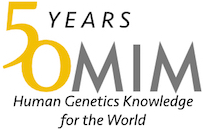 The Online Mendelian Inheritance in Man® (OMIM) web site is an online catalog of human genes and genetic disorders. It has some information on the genetics of GSD13.
The Online Mendelian Inheritance in Man® (OMIM) web site is an online catalog of human genes and genetic disorders. It has some information on the genetics of GSD13.
![]() Visit the Online Mendelian Inheritance in Man page on GSD 13.
Visit the Online Mendelian Inheritance in Man page on GSD 13.
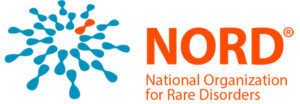
The National Organisation for Rare Disorders (NORD) has a minimal amount of information about GSD13.
Other sources of information
![]() The International Association for Muscle Glyogen Storage Disease has a page on GSD13.
The International Association for Muscle Glyogen Storage Disease has a page on GSD13.
![]() Go to the IamGSD page on GSD13.
Go to the IamGSD page on GSD13.
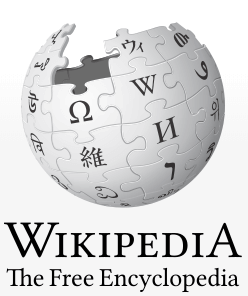 Due to the relative dearth of information on GSD13, you may find this page on Wikipedia to be useful, although at present it is very technical.
Due to the relative dearth of information on GSD13, you may find this page on Wikipedia to be useful, although at present it is very technical.
Published papers on GSD13
β-Enolase deficiency, a new metabolic myopathy of distal glycolysis.
Comi, et al. (2001). Annals of Neurology. 50. 202 – 207. 10.1002/ana.1095.
![]() View the abstact of this paper on PubMed.
View the abstact of this paper on PubMed.
Recurrent rhabdomyolysis due to muscle β-enolase deficiency: very rare or underestimated?
Musumeci, et al. (2014). Journal of neurology. 261. 2424-8. 10.1007/s00415-014-7512-7.
Scheme of glycogen metabolism and glycolysis
The enzyme disorder in GSD13 (XIII) is located close to the end of the metabolic pathway.
Roman numerals indicate enzymes whose deficiencies cause liver and/or muscle glycogenoses, including:
V – myophosphorylase (McAdle disease, GSD5)
XIII – β-enolase (GSD13)
![]() Diagram courtesy of: “Inborn Metabolic Diseases: Diagnosis and Treatment”.
Diagram courtesy of: “Inborn Metabolic Diseases: Diagnosis and Treatment”.
Clinical support
![]() In the UK the McArdle Disease and related disorders service is nationally commissioned by NHS England. GSD13 is one of the related disorders which is supported by the service. It operates a multidisciplinary clinic within CNMD, part of the National Hospital for Neuroloy and Neurosurgey in London. Patients can be referred to the clinic by their GP. There are full details in our McArdle disease (GSD5) section.
In the UK the McArdle Disease and related disorders service is nationally commissioned by NHS England. GSD13 is one of the related disorders which is supported by the service. It operates a multidisciplinary clinic within CNMD, part of the National Hospital for Neuroloy and Neurosurgey in London. Patients can be referred to the clinic by their GP. There are full details in our McArdle disease (GSD5) section.
Read about the service and how to be referred to the clinic.
Commonality with GSD5
There is a lot of commonality between McArdle disease (GSD5) and GSD13. The suggestions in the book “101 Tips for a good life with McArdle disease” will almost all apply. Please ask us for a copy.
In the event of an episode of rhabdomyolysis, it is possible to follow the advice for such episodes in McArdle’s, as given by IamGSD
Are you affected by GSD13?
AGSD-UK can offer you support, and try to enable you to make connections with others affected by this very rare condition. We can support you with accessing non-medical help if appropriate.
All GSDs pulling together makes us all stronger.
